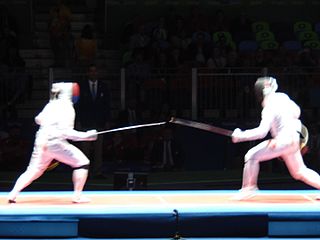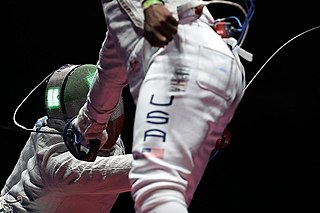
The men's sabre was one of eight fencing events on the fencing at the 1964 Summer Olympics programme. It was the fifteenth appearance of the event. The competition was held from October 19 to 20, 1964. 52 fencers from 21 nations competed. Nations had been limited to three fencers each since 1928. The event was won by Tibor Pézsa, the final of nine straight Games in which a Hungarian fencer won the event. The silver medal went to Claude Arabo of France, with Umyar Mavlikhanov of the Soviet Union taking bronze.

The men's épée fencing competition at the 2008 Summer Olympics in Beijing took place on August 10 at the Olympic Green Convention Centre. There were 41 competitors from 23 nations. The event was won by Matteo Tagliariol of Italy, the nation's first victory in the event since 1960 and first medal of any color since 1968. It was Italy's seventh overall victory, most among nations. The silver medal went to Fabrice Jeannet of France. José Luis Abajo earned Spain's first men's individual épée medal with his bronze. The Russian fencers' streak of five Games on the podium ended.

The men's sabre fencing competition at the 2008 Summer Olympics in Beijing took place on August 12 at the Olympic Green Convention Centre. There were 40 competitors from 21 nations. The event was won by Zhong Man of China, the nation's first medal in the men's sabre. Nicolas Lopez's silver put France back on the podium after a one-Games absence. Mihai Covaliu of Romania became the 13th man to win multiple medals in the event, adding a bronze to his 2000 gold medal.

The men's épée was one of ten fencing events on the fencing at the 1996 Summer Olympics programme. It was the twenty-second appearance of the event. The competition was held on 20 July 1996. 45 fencers from 21 nations competed, a sharply reduced number from prior Games which generally had 60 to 80 fencers. Each nation remained limited to 3 fencers in the event. The event was won by Aleksandr Beketov of Russia, the nation's first victory and first medal in the event in its debut. Iván Trevejo's silver was Cuba's first medal in the event since Ramón Fonst won the first two gold medals in 1900 and 1904. The bronze went to Géza Imre of Hungary, that nation's first medal in the men's individual épée since 1980. France's four-Games podium streak ended.

The men's épée competition in fencing at the 2012 Summer Olympics in London was held on 1 August at the ExCeL London Exhibition Centre. There were 30 competitors from 24 nations. Rubén Limardo of Venezuela won the gold medal – the country's only medal of the 2012 Games as well as the country's first medal in men's individual épée. Norway's Bartosz Piasecki won silver and Jung Jin-Sun from South Korea took bronze.

The men's sabre competition in fencing at the 2012 Summer Olympics in London was held on 29 July at the ExCeL London Exhibition Centre. There were 37 competitors from 21 nations. Hungary's Áron Szilágyi won the gold medal, beating Diego Occhiuzzi of Italy won took silver. Nikolay Kovalev from Russia won the bronze. Szilágyi's gold medal was Hungary's 13th in the men's sabre.

Áron Szilágyi is a Hungarian right-handed sabre fencer. A five-time Olympian, Szilágyi is a three-time individual Olympic champion and 2021 team Olympic bronze medalist.

The men's épée competition in fencing at the 2016 Summer Olympics in Rio de Janeiro was held on 9 August at the Carioca Arena 3. There were 38 competitors from 20 nations. South Korea's Park Sang-young won the individual gold, the first victory for South Korea in the event after bronze medals in 2000 and 2012. Géza Imre took silver, Hungary's first medal in the event since 1996. Imre, at age 41, was the oldest individual fencing medalist since 1952. Gauthier Grumier of France earned bronze.
The men's foil competition in fencing at the 2016 Summer Olympics in Rio de Janeiro was held on 7 August at the Carioca Arena 3. The medals were presented by Paul Tergat, IOC member, Kenya and Donald Anthony Jr., Executive Board Member of FIE. There were 35 competitors from 19 nations. The event was won by Daniele Garozzo of Italy, the nation's ninth victory in the men's foil and first since 1996. The silver medalist was American Alexander Massialas, earning the United States' first medal in the event since 1960. Timur Safin of Russia took bronze.

The men's sabre competition in fencing at the 2016 Summer Olympics in Rio de Janeiro was held on 10 August at the Carioca Arena 3. There were 32 competitors from 25 nations. The event was won by Áron Szilágyi of Hungary, the fourth man to successfully defend an Olympic title in the sabre and 14th to win multiple medals of any color. It was Hungary's 14th gold medal in the event, half of all possible. Daryl Homer earned the United States' first medal in the event since 1984 with his silver, while Kim Jung-hwan took South Korea's first individual men's sabre medal ever with his bronze.

The men's foil event at the 2020 Summer Olympics took place on 26 July 2021 at the Makuhari Messe. 36 fencers from 18 nations competed in this event.

The women's foil event at the 2020 Summer Olympics took place on 25 July 2021 at the Makuhari Messe. 34 fencers from 18 nations are expected to compete.

The men's team foil event at the 2020 Summer Olympics took place on 1 August 2021 at the Makuhari Messe. 27 fencers from 9 nations are expected to compete.

The women's team foil event at the 2020 Summer Olympics is scheduled to take place on 29 July 2021 at the Makuhari Messe. 24 fencers from 8 nations are expected to compete.

The men's épée event at the 2020 Summer Olympics took place on 25 July 2021 at the Makuhari Messe. 36 fencers from 18 nations competed.

The women's épée event at the 2020 Summer Olympics took place on 24 July 2021 at the Makuhari Messe. 34 fencers from 18 nations competed.

The men's team épée event at the 2020 Summer Olympics took place on 30 July 2021 at the Makuhari Messe. 27 fencers from 9 nations competed. The competition was won by Japan, with Russian Olympic athletes taking silver and South Korea bronze. The previous medal of Russia in men's team épée was in 1996; Japan and South Korea never medaled in this event. The 2016 champions and silver medalist, Italy and France, did not make it to the semifinals, the bronze medalist, Hungary, did not quality for the Olympics.

The women's sabre event at the 2020 Summer Olympics took place on 26 July 2021 at the Makuhari Messe. 36 fencers from 18 nations competed.

The men's team sabre event at the 2020 Summer Olympics took place on 28 July 2021 at the Makuhari Messe, with 27 fencers from 9 nations competing.

The women's team sabre event at the 2020 Summer Olympics took place on 31 July 2021 at the Makuhari Messe. 27 fencers from 9 nations are expected to compete.












